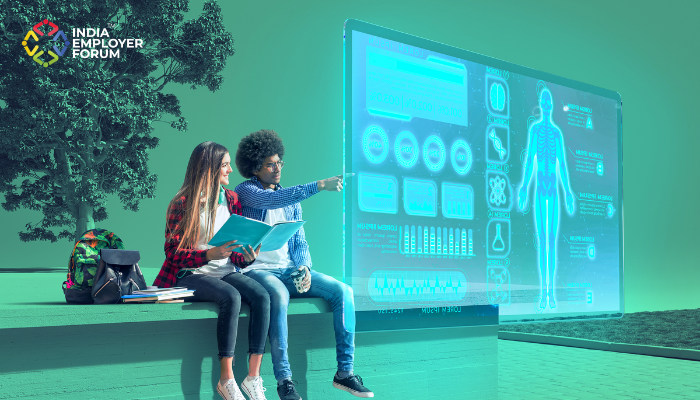In recent years, the landscape of higher education in India has been rapidly evolving, thanks to the emergence of advanced technologies such as AI, remote learning platforms, and online learning. These developments have not only opened up new opportunities for students to acquire knowledge and skills but have also transformed the way education is delivered in the country.
One of the most significant benefits of these new technologies is their potential to enhance students’ skill development. The traditional approach to education in India has often been criticised for placing too much emphasis on rote learning and memorisation, leaving students ill-equipped to meet the demands of a rapidly changing job market. However, AI and remote learning platforms have the potential to change this, by providing students with personalised learning experiences that are tailored to their individual needs and interests.
AI-based learning platforms can analyse a student’s learning patterns and preferences, and then use this information to deliver customised learning experiences that are optimised for their individual needs. This can include everything from personalised lesson plans to targeted feedback and assessment, all of which are designed to help in skill development of the students to succeed in the modern job market.
In addition to this, remote learning platforms and online courses can provide students with access to a wider range of educational resources and opportunities than they would have had otherwise. This is particularly important in a country like India, where many students face significant barriers to accessing higher education, such as geographic distance or financial constraints.
By leveraging the power of technology, remote learning platforms can connect students with expert educators from around the world, and provide them with access to high-quality educational content that they may not have been able to access otherwise. This can include everything from online courses and video lectures to virtual reality simulations and interactive games, all of which are designed to enhance skill development among students, preparing them for the demands of the modern workforce.
Furthermore, these platforms also offer a level of flexibility and convenience that is simply not possible with traditional classroom-based learning. Students can access their course materials and complete assignments at their own pace, from anywhere in the world, allowing them to balance their studies with other commitments such as work or family responsibilities.
Overall, the combination of AI, remote learning platforms, and online learning has the potential to transform the way education is delivered in India, by providing students with the skills and knowledge they need to succeed in the modern job market. However, there are also challenges that must be addressed if these technologies are to be used effectively.
One of the biggest challenges is ensuring that students have access to the necessary infrastructure and resources to take advantage of these technologies. In many parts of India, access to high-speed internet and modern computing equipment still needs to be improved, making it difficult for students to participate in online courses or use AI-based learning platforms effectively.
To overcome this challenge, the government and private sector must work together to invest in the necessary infrastructure and resources to support these technologies. This could include everything from building new broadband networks to providing students with access to high-quality computing equipment and software.
Another challenge is ensuring that these technologies are used effectively by educators and students alike. While AI and remote learning platforms have the potential to revolutionise education, they are only as effective as the people who use them. Therefore, it is essential that educators receive adequate training and support to use these technologies effectively, and that students are provided with the necessary guidance and support to make the most of their learning experiences.
To achieve this, universities and educational institutions must invest in training programmes and resources that help educators and students understand how to use these technologies effectively. This could include everything from online training courses to dedicated support teams that are available to answer questions and provide guidance to students and educators alike.
Finally, there is a need to ensure that the curriculum and learning materials used in these technologies are up-to-date and relevant to the needs of the modern job market. One of the key advantages of these new technologies is their ability to adapt and evolve in response to changing market demands. As the job market evolves and new skills become more in demand, AI and remote learning platforms can quickly update their content and curriculum to reflect these changes, ensuring that students are always learning the latest and most relevant skills.
However, to ensure that these technologies are used effectively, it is essential that educators and students are able to work together to identify the skills that are most in demand and to develop learning programmes that are specifically designed to meet these needs. This requires collaboration between educational institutions, industry leaders, and policymakers, to ensure that the skills being taught are aligned with the needs of the job market.
In conclusion, the combination of AI, remote learning platforms, and online learning has the potential to revolutionise higher education in India, by providing students with the skills and knowledge they need to succeed in the modern job market. However, to realise this potential, it is essential that policymakers, educators, and industry leaders work together to overcome the challenges of infrastructure, training, and curriculum development.
By investing in these technologies and providing the necessary support and guidance to educators and students alike, we can create a future in which higher education in India is more accessible, more effective, and better able to meet the needs of the modern job market. This will not only benefit individual students but will also help to drive economic growth and prosperity for the country as a whole.
Reference: How AI, remote learning platforms, and student skill development are reviving higher education in India | India Today | April 2023
You might also be interested to read: Lifelong Learning as a Game-Changer in the Competitive Job Market






